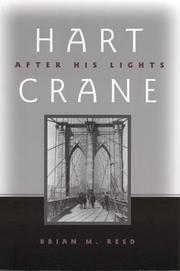| Listing 1 - 5 of 5 |
Sort by
|
Book
ISBN: 0817386017 9780817386016 9780817356941 0817356940 Year: 2012 Publisher: Tuscaloosa University of Alabama Press
Abstract | Keywords | Export | Availability | Bookmark
 Loading...
Loading...Choose an application
- Reference Manager
- EndNote
- RefWorks (Direct export to RefWorks)
The essays in Phenomenal Reading entice readers to cross accepted barriers, and highlight the work of poets who challenge language-as-usual in academia and the culture at large. Phenomenal Reading is comprised of essays that are central to how best to read poetry. This book examines individually and collectively poets widely recognized as formal and linguistic innovators. Why do their words appear in unconventional orders? What end do these arrangements serve? Why are they striking? Brian Reed focuses on poetic form as a persistent puzzle
Literature, Modern --- Poetics. --- Poetry --- History and criticism. --- Technique
Book
ISBN: 0801469570 0801469589 9780801469589 0801451574 9780801451577 9780801451577 1322522464 Year: 2013 Publisher: Ithaca, NY : Cornell University Press,
Abstract | Keywords | Export | Availability | Bookmark
 Loading...
Loading...Choose an application
- Reference Manager
- EndNote
- RefWorks (Direct export to RefWorks)
Since the turn of the new millennium English-language verse has entered a new historical phase, but explanations vary as to what has actually happened and why. What might constitute a viable avant-garde poetics in the aftermath of such momentous developments as 9/11, globalization, and the financial crisis? Much of this discussion has taken place in ephemeral venues such as blogs, e-zines, public lectures, and conferences. Nobody's Business is the first book to treat the emergence of Flarf and Conceptual Poetry in a serious way. In his engaging account, Brian M. Reed argues that these movements must be understood in relation to the proliferation of digital communications technologies and their integration into the corporate workplace. Writers such as Andrea Brady, Craig Dworkin, Kenneth Goldsmith, Danny Snelson, and Rachel Zolf specifically target for criticism the institutions, skill sets, and values that make possible the smooth functioning of a postindustrial, globalized economy. Authorship comes in for particular scrutiny: how does writing a poem differ in any meaningful way from other forms of "content providing"? While often adept at using new technologies, these writers nonetheless choose to explore anachronism, ineptitude, and error as aesthetic and political strategies. The results can appear derivative, tedious, or vulgar; they can also be stirring, compelling, and even sublime. As Reed sees it, this new generation of writers is carrying on the Duchampian practice of generating antiart that both challenges prevalent definitions or art and calls into question the legitimacy of the institutions that define it.
Poetics --- Experimental poetry, American --- American poetry --- Poetry --- American literature --- History --- History and criticism. --- Technique --- 21st century --- History and criticism --- Experimental poetry [American ] --- Snelson, Danny --- Brady, Andrea --- Flarf Collective --- Dworkin, Craig --- Farrell, Dan --- Goldsmith, Kenneth --- Perloff, Marjorie Gabrielle
Multi
ISBN: 9780801469589 9780801451577 Year: 2013 Publisher: Ithaca London Cornell University Press
Abstract | Keywords | Export | Availability | Bookmark
 Loading...
Loading...Choose an application
- Reference Manager
- EndNote
- RefWorks (Direct export to RefWorks)
Literature --- Snelson, Danny --- Brady, Andrea --- Flarf Collective --- Dworkin, Craig --- Farrell, Dan --- Goldsmith, Kenneth --- Perloff, Marjorie Gabrielle

ISBN: 0817314881 9780817314880 0817352708 0817382925 9780817382926 9780817352707 Year: 2006 Publisher: Tuscaloosa University of Alabama Press
Abstract | Keywords | Export | Availability | Bookmark
 Loading...
Loading...Choose an application
- Reference Manager
- EndNote
- RefWorks (Direct export to RefWorks)
A critical reassessment of the life's work of a major American poet. With his suicide in 1932, Hart Crane left behind a small body of work-White Buildings (1926) and The Bridge (1930). Yet, Crane's poetry was championed and debated publicly by many of the most eminent literary and cultural critics of his day, among them Van Wyck Brooks, Kenneth Burke, Robert Graves, Allen Tate, and Edmund Wilson. The Bridge appears in its entirety in the Norton Anthology of American Literature, and Crane himself has been the subject two recent biographie
Crane, Harold Hart --- Criticism and interpretation --- Modernism (Literature) --- United States --- Crane, Hart, --- Crane, Harold Hart, --- Criticism and interpretation. --- Crane, Hart
Book

ISBN: 0826360483 Year: 2019 Publisher: Albuquerque : University of New Mexico Press,
Abstract | Keywords | Export | Availability | Bookmark
 Loading...
Loading...Choose an application
- Reference Manager
- EndNote
- RefWorks (Direct export to RefWorks)
The essays in Inciting poetics provide a variety of provocative answers to the book's opening question, "What are the poetics now?" Authored by some of the most important contemporary poets and critics, the essays present new theoretical and practical approaches to poetry and poetics that address current topics and approaches in the field as well as provide fresh readings of a number of canonical poets. The four sections - "What is poetics?", "Critical interventions", "Cross-cultural imperatives", and "Digital, capital, and institutional frames" - create a basis on which both experienced readers and newcomers can build an understanding of how to think and write about poetry. The diverse voices throughout the collection are both informative and accessible and offer a rich exploration of the multiple approaches to thinking and writing about poetry today.
Poetry --- Poetics. --- Authorship.
| Listing 1 - 5 of 5 |
Sort by
|

 Search
Search Feedback
Feedback About UniCat
About UniCat  Help
Help News
News